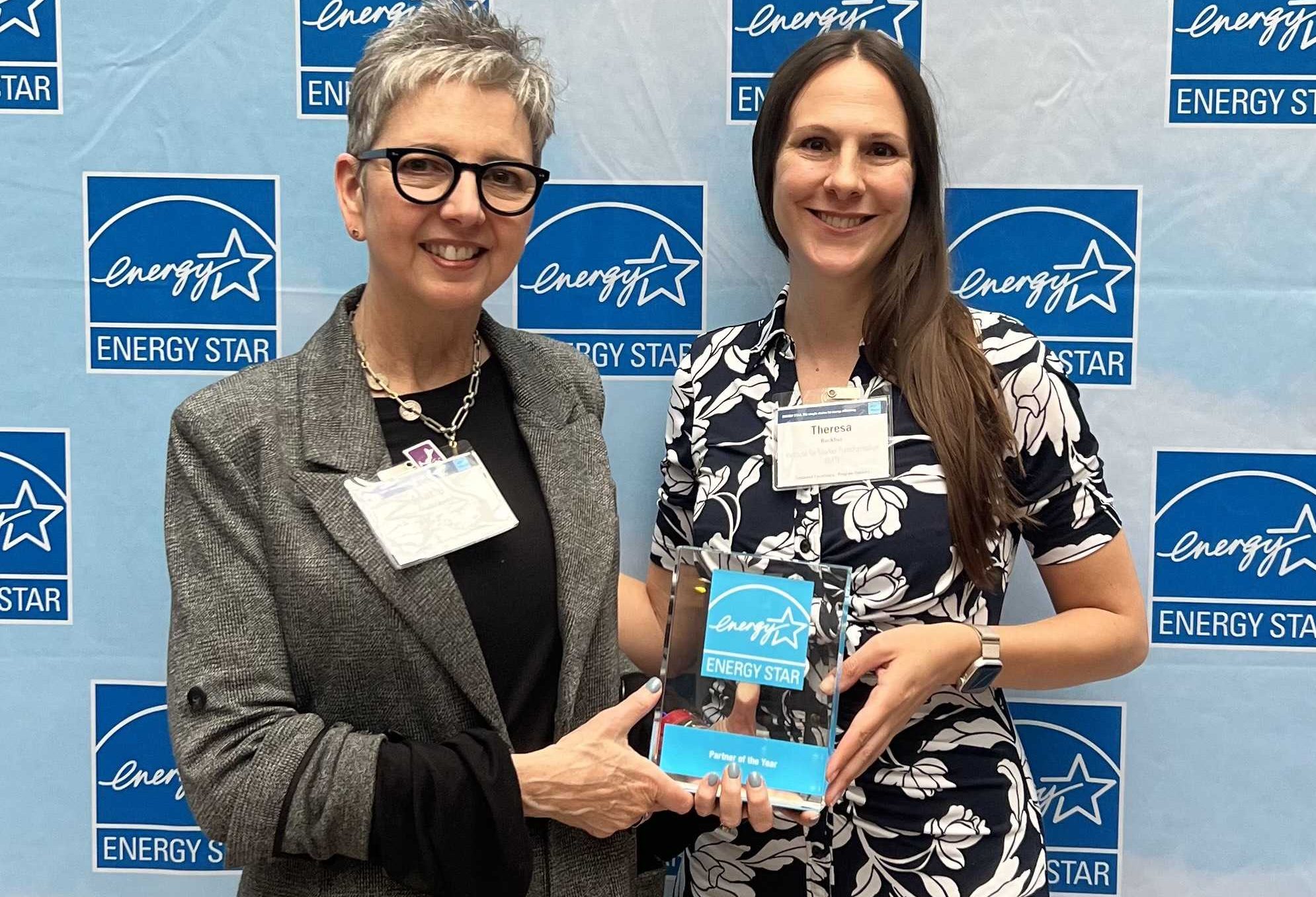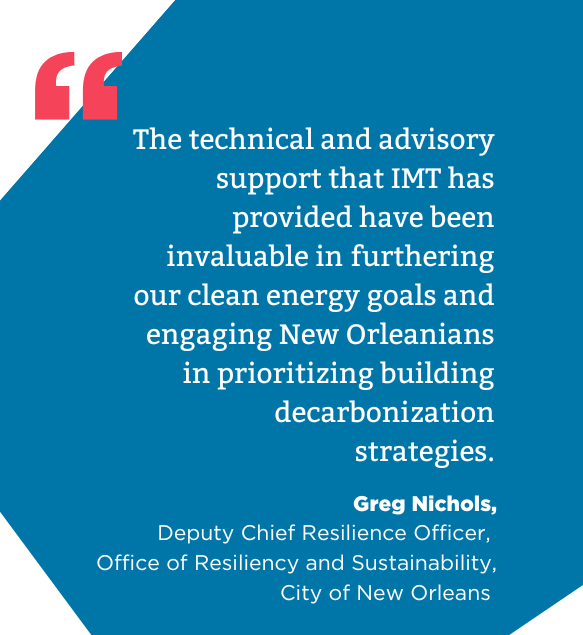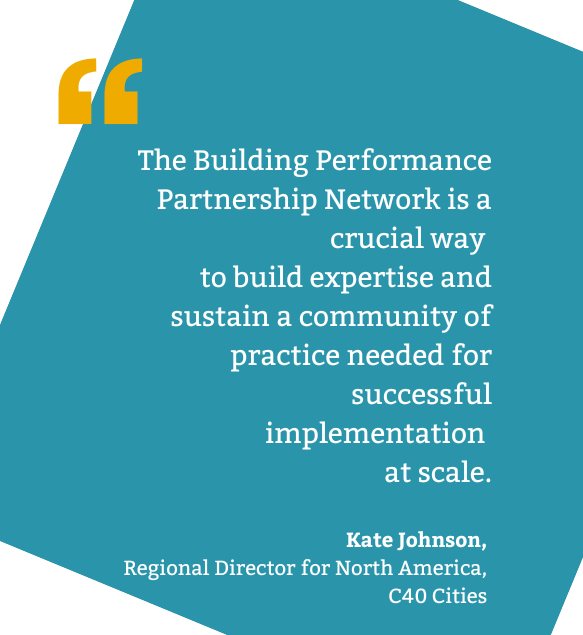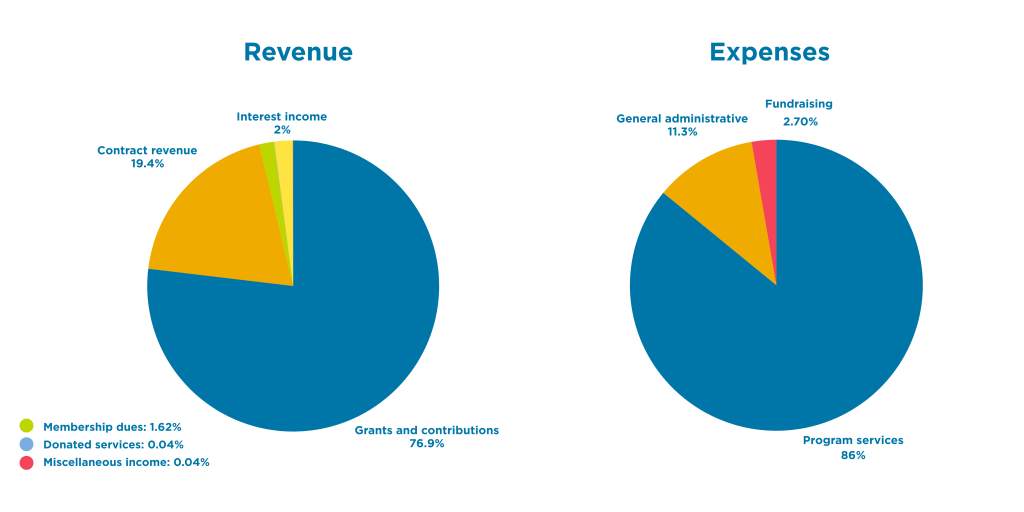

Note from our CEO
This year has been like no other, challenging IMT and our partners to be bold and creative in how we expand access to efficient, high-performance buildings. We have had to pivot to respond to tremendous federal and market uncertainties, including for several previously awarded multi-year federal grants.
We have been able to navigate this moment in large part because of the groundwork we’ve laid. For the past 30 years, IMT has carefully forged relationships with real estate partners, state and local policymakers, community coalitions, and other nonprofit sustainability leaders. These collaborations are critical to overcoming short-term disruptions, and are what put us in a position to not only defend the progress we’ve already made, but move forward together with ambition and clarity of purpose.
I am so grateful to the many partners who have remained engaged with us to continue our work together, much of which is described in this report. I am also tremendously grateful to our staff, who have been infinitely creative, flexible, and persistent in finding new paths forward while we have continued to navigate a new and uncertain landscape. Thanks to their help, we are on strong footing for 2026, and making steady progress toward our 2030 goals. The future of buildings is healthy, clean, and efficient. Through networks like the National BPS Coalition or the Building Performance Partnership, local leaders are continuing to move this work forward, and we will continue to support their efforts individually and at scale. We deeply appreciate your continued partnership and support. Let’s press forward, together.
Alex Dews
Chief Executive Officer

Protecting critical federal resources for better buildings
The federal government’s ENERGY STAR program has been an incredible success in saving taxpayer dollars and reducing energy waste nationwide. In 2025, we mobilized a wide cross-section of supporters to engage with Congress and the media to protect it from an effort to privatize the program and end public funding. Our staff was interviewed in Bloomberg and Facilities Dive talking about this issue.
Making building improvements accessible and equitable
Not everyone has equal access to resources for building improvements. IMT is moving forward with new research and projects on how to make building decarbonization policies easier and more affordable. In 2025, we published a landscape review of alternative compliance paths and began developing a new strategic decarbonization policy framework, engaging through a working group of 12 government partners, and over 50 of leading experts from real estate, engineering, and educational sectors. In parallel, we published new guidance on how governments are integrating equity into their building policies, based on feedback from community-based organizations, nonprofits, real estate professionals, and government staff in the U.S. and Canada.


Taking the helm of Green Lease Leaders
The 2025 Green Lease Leaders cycle was the first one we managed independently, as part of a planned transition from the Department of Energy. Half of our cohort are new Green Lease Leaders. Over 25% of our winners are international companies, maintaining a consistent trend for the past few years of international companies utilizing green leases and earning recognition. Our current Green Lease Leaders own or lease over 9 billion sq ft of space. We launched new consulting services, brought in more international applicants, and continued our strong industry partnerships in support of green leases.
Helping building owners take action and manage risk
Our Corporate Engagement Opportunities program scales market transformation by helping real estate owners understand policy requirements and quantify the risks of non-compliance. The program tracks more than 170 data fields for over 150 U.S. building policies, providing building owners, managers, and service providers with the critical information they need to navigate the policy landscape. In 2025, the program increased membership by 45% from 2024, and maintained a 93% renewal rate.
Spotlight
Assuming leadership of the National BPS Coalition
In January 2025, we took over management of the National Building Performance Standards Coalition, a group of 49 local and state governments committed to passing building improvement policies. IMT has provided strategic direction, hosted virtual convenings, and launched a new BPS resource library that serves as a central knowledge repository for governmental and private resources about this topic. IMT has also offered guidance on moving forward as federal grants have been delayed or suspended.

If all Coalition members passed BPS policies, the savings by 2040 could eliminate the need for over
100
power plants
More than
9 billion
square feet of real estate covered by the Green Lease Leaders program around the world
Beyond
330,000
buildings use ENERGY STAR to track their data
Catalyzing local leadership & civic engagement
Advancing equitable building decarbonization from the ground up
We launched numerous partnerships at the local and state level to support community-based building decarbonization. In New Orleans, our coalition’s persistence paid off as the City’s benchmarking ordinance crossed the finish line to become law. In California, IMT continues to work with several community-based organizations and the California Energy Commission (CEC) as the state considers the adoption of a BPS. With over 4 billion square feet of buildings, California would become the largest jurisdiction covered by a BPS to date.
Pushing forward utility data access laws
Many building managers don’t know how much energy their buildings use because they can’t access full utility data for their properties. To fix this, IMT collaborated with BOMA Chicago, the Illinois Clean Jobs Coalition, and the Illinois Green Alliance to advance the state legislation inspired by IMT’s Model Utility Data Access Law.
IMT played a key role in negotiations and advocacy, and the law passed in the Illinois legislature as part of the Clean & Reliable Grid Affordability Act.

Spotlight
Transforming real estate in the nation’s capital region
Our Building Innovation Hub team continued to catalyze building improvements by connecting houses of worship, condos, and real estate professionals to resources for better buildings across DC, Maryland, and Virginia. The Hub launched Green Table Talks to encourage honest, informal policy conversations, and Maryland Energy Benchmarking Office Hours to help real estate professionals meet new state regulations. The Hub also spoke during DC’s first Climate Week, and co-hosted an event with the Montgomery County Green Bank at Daikin’s Sustainability and Innovation Center. In 2025, the Hub created 16 resources, engaged about 4,500 people, and supported over 25 million square feet of real estate across the region!

Over
2,500
buildings benefitted from Hub outreach and support
We worked in more than
60
cities and states in the U.S. and Canada
We reached more than
667
attendees through policy convenings
Transforming local markets at scale
To make high-performing buildings the new normal in real estate, we need to build and connect local communities of practice nationwide. That’s why IMT co-founded the Building Performance Partnership (BPP) Network with the Building Energy Exchange (BE-Ex), to engage regional stakeholders to advance local building energy efficiency, decarbonization, and policy compliance. This summer, we added three new organizations to the BPP network: Aspen CORE serving the City of Aspen and surrounding counties, the Better Buildings Hub serving the Philadelphia region, and the Building Performance Exchange serving the state of Massachusetts. We also launched a new BPP brand and website and hosted an event during New York City’s Climate Week.
Protecting scaling climate financing aligned with community impact
The Greenhouse Gas Reduction Fund (GGRF) is a $27 billion federal investment in clean energy deployment designed to catalyze a national clean energy financing network. While the federal GGRF funds are stalled in litigation, IMT has made progress on local climate financing and built relationships to continue to advance this work. We’ve led a peer learning cohort of community lenders in Southeast Pennsylvania, completed needs assessments for investments in five key regions, and advanced discussions with state housing finance agencies to leverage private funds to meet similar climate and community targets. This work was possible with the help of our partners, including the William Penn Foundation, the Green Family Foundation, and Invest in Our Future.
Community Climate Shift
This year, our innovative partnership brought together over 40 participants for a convening on increasing resident and community power. We also continued moving resources to community partners, with $600,000 in funding to support 10 equitable decarbonization projects at the local level. Now in its third year, CCS continues to evolve and IMT is adapting our role to support the needs of partners and ensure that community-based organizations continue to lead on strategy and decision making.

Spotlight
Climate Champion Award
At the SAJE gala on March 27, Rajiv Ravulapati on behalf of IMT, accepted the Climate Champion Award for our ongoing commitment to equitable decarbonization and bridging the needs of business, government, and communities. This recognition reflects our partnership with SAJE and our shared commitment to equitable decarbonization while prioritizing tenant protections.

We secured more than
$10 million
for Community Climate Shift projects in 15 locations
IMT’s climate finance cohort members include seven CDFIs that collectively made over
$450 million
in mission-aligned commercial loans in 2024
The BPP network will serve almost
3.7 billion
square feet of commercial and residential buildings over 25k square feet each
Financial Snapshot



Support our work.
The Institute for Market Transformation (IMT) bridges the intersection of business, government, and community priorities to spotlight business practices and advance public policy to improve U.S. buildings.


